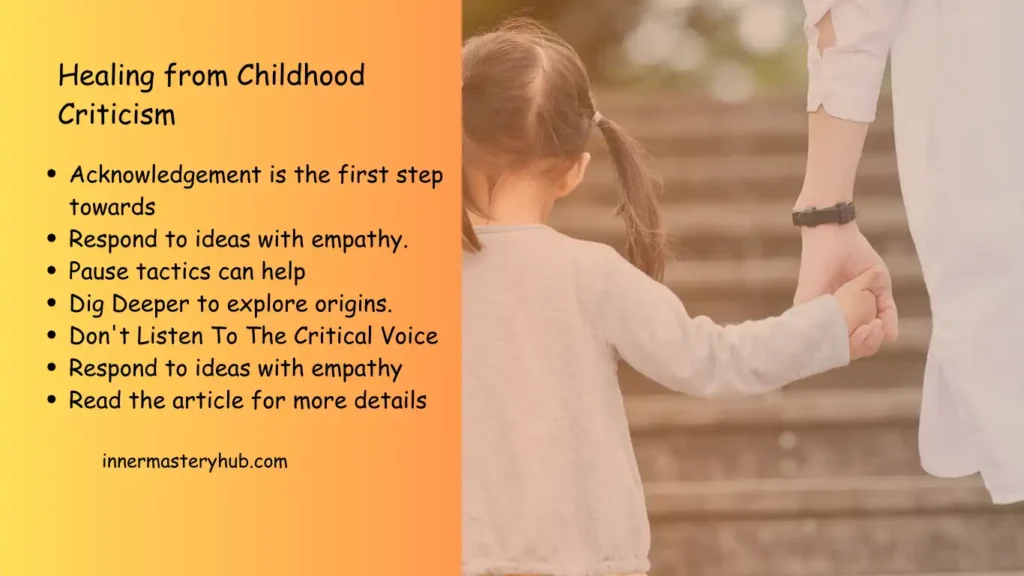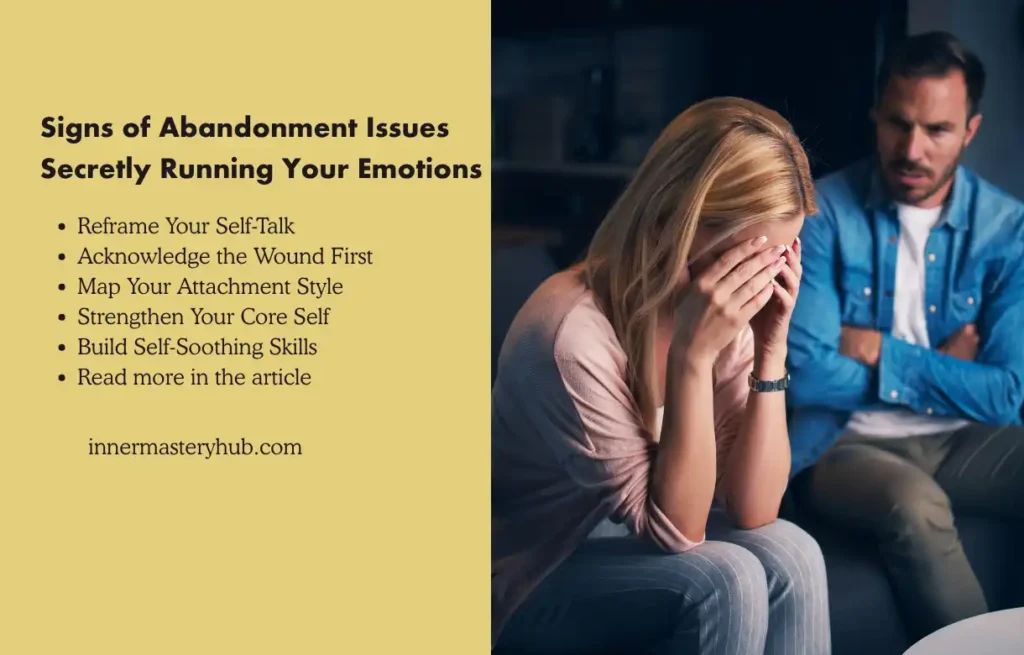Healing from Childhood Criticism Can Transform Your Perspective on Life
Healing from Childhood Criticism
Healing from childhood criticism takes patience and self-kindness. Notice your old patterns, challenge harsh inner voices, and build healthy self-talk to restore confidence gradually. Supportive relationships, reflection, and small daily affirmations can help replace criticism with understanding, acceptance, and emotional strength.

Being criticized during childhood impacts everything. People hold those old words for years and make decisions unconsciously. A dad who continually pointed out flaws shaped your reactions, which led you to a different course.
Resolving childhood criticism and rebuilding is necessary to recover. This release of self-doubt energy enables people to discover opportunities that were previously overlooked.
Binghamton University found that children with critical parents tend to ignore emotional cues throughout adulthood, which can affect their relationships. While learning to address them and healing from Childhood Criticism clarifies your perspective on life.
When you have faced Constant Criticism in Childhood
Parents and caregivers occasionally say hurtful words without meaning to. Criticism in those early years included continuous corrections for minor mistakes or comparisons to more accomplished individuals.
Early brain development in the first seven years makes every comment stick like glue to children. PMC research on praise and criticism in young children shows that criticism lowers self-esteem and increases rebellion.
A client who grew up hearing she never accomplished enough hesitated on simple choices as an adult, fearing criticism. This atmosphere makes kids question their worth from the very beginning.
Because criticism is camouflaged as an incentive or harsh love, society overlooks this. Parents repeat their experiences due to a lack of support, and early emotional neglect increases self-criticism later in life, according to a report.
Children in these environments may achieve in school or athletics to escape criticism, but they build walls against self-esteem. No oneidentifying the pattern leaves the youngster to internalize it as who they are, which gets worse.
The Psychological Effects of Constant Criticism in Childhood
Constant criticism leaves lasting impressions on the mind. Low self-esteem becomes normal, and people doubt their talents everywhere. Perfectionism becomes a defense mechanism, causing overwork to feel good.
Studies from the National Center for Biotechnology Information show that parental criticism lowers reward-related brain responses, causing anxiety and depression. In my life, minor failures caused massive emotional collapse, bringing back older voices that suggested I wasn’t good enough.
Trust becomes difficult when you expect criticism from everyone, causing relationship issues. People who fear abandonment may push those away or clutch too tightly. Children often hide their vulnerabilities, which can lead to adult isolation. If the cycle continues to repeat itself, it passes the burden to the next generation without breaking free.
The Physical Toll of Constant Criticism in Childhood
Negative thinking increases stress hormones like cortisol, which weigh the body down. Psychosomatic symptoms often cause stomach problems or headaches that doctors can’t explain. Childhood trauma wires the neural system for hypersensitivity, according to research. Addressing those fundamental memories relieved my shoulder strain. Poor sleep and energy levels make daily duties burdensome.
Chronic stress can damage the immune system and cause heart problems. A ScienceDirect article links childhood trauma to adult behavior changes that harm health. People often ignore body signals because criticism has taught them to endure pain. This gap causes burnout when mind and body demand alignment.
The Lasting Impact of Being Criticized During Childhood
Those early experiences shape a person’s profession, friendships, and self-perception for decades. PMC research links developmental trauma to social cognition issues. Psychological problems are rising, with Nature citing constant criticism in childhood as a risk factor. Remembering how much life they’ve missed in unchosen routines agitates them.
Why the Scars Last So Long
Trauma changes how the brain receives feedback and failure. Trauma affects emotional intelligence, making criticism feel fresh, according to Frontiers research. The inner child stays attentive and reacts strongly to old wounds. The child feels hypersensitive in discussions, as even small comments can generate defensiveness, a trait that persists into adulthood.
Without healing, these scars deepen, preventing intimacy and success. e the past to improve the future. Why wonder why they ruin excellent things, not realizing that early lessons told them they didn’t deserve them.
What are the types of childhood criticism?
Childhood criticism can take several forms:
Verbal Criticism – harsh words, insults, or constant correction.
Comparative Criticism – being compared unfavorably to siblings or peers.
Emotional Criticism – withdrawal of love, coldness, or disapproval.
Perfectionism Pressure – expecting flawless behavior or achievements.
Public Criticism – shaming in front of others.
The Roots of the Wound Shapes Your Perception
Constant criticism distorts reality, making neutral events dangerous. Trauma research shows complex instant responses linked to past experiences. inInewiring for protection backfires in safety. iscovered this when compliments seemed suspect, having never received genuine praise.

The Distortion Effect: When Your Brain Betrays You,
perception twists and catastrophizing become habits. Fletcher’s blog describes how trauma makes disrespect excruciating. All comments can escalate into significant concerns, depleting energy. Assume the worst in interactions.
This sabotage exhausts you, making every interaction a battle. Because the mind concentrates on criticism rather than positives, relationships and possibilities degrade.
What does criticism do to a child?
Criticism can make a child feel unsafe, unworthy, or afraid of making mistakes. At times, it may damage self-esteem, create anxiety, and teach the child to judge themselves harshly. Children often internalize criticism, shaping how they see their value and abilities.
How to overcome childhood criticism?
Overcoming childhood criticism starts with self-awareness and self-compassion. Challenge negative self-beliefs, practice positive self-talk, set healthy boundaries, and seek supportive relationships. rapy, journaling, and affirmations help heal old wounds and build confidence and inner strength.
Understanding Our ‘Raw Spots’
Raw spots are tender places that result from unfulfilled demands and can be easily aroused. Marriage and Family PLLC explores how criticism shapes them. You create overreactions in maturity, such as anger over minimal feedback. It revolved around achievement, and no amount of work ever seemed to be enough.
These areas disrupt everyday living, making peace difficult to find. Without awareness, they influence behaviors, trapping someone in a state of survival mode. The nerdy child may act out or retreat to get attention as a result.
Beginning the Healing from Childhood Criticism
Acknowledgement is the firststep towards healing. started by writing down old experiences and quickly recognising patterns. nselling is beneficial because formal assessment is recommended by the RACGP guidelines for adult survivors, which replaces Harsh inner dialogue with self-compassion exercises.
- Visualization helps you reconnect. Journaling uncovers hidden feelings. Play activities lighten the load. I tried drawing what my inner child needed, finding release.
- Observe your feelings without passing judgment and use evidence to challenge your beliefs. Find out new skills that support self-compassion and growth-oriented thinking, like reframing criticism as other people’s problems, not yours.
- Pause tactics can help. Tim Fletcher’s three-step technique scans the body, assesses reality, and determines a reaction. I followed the 10-minute rule for cooling down.
- Respond to ideas with empathy. You can shift focus by gratitude. I created morning affirmations and other rituals.
- Therapy can reveal roots. Trauma can be processed with hypnotherapy or EMDR. I discovered that somatic work helped to relieve buried tension.
- Integration heals. Kasia Kolek discusses mind-body-spirit harmonisation to embrace authenticity and find joy.
- Dig Deeper to explore origins. LIC suggests understanding projection. Empathy for parents aids forgiveness.
- Allow Yourself to Be Angry; It Signals Your Needs. Process it safely with exercise to release it.
- Don’t Listen To The Critical Voice In Your Head and replace it with truth. Become Aware of How You Talk to Yourself
- Recognize the Signs of an Angry Inner Child by Watching for Triggers.
FAQs about healing from childhood criticism
What are the signs that childhood criticism is affecting my adult life?
Signs include low self-esteem, perfectionism, relationship anxiety, and hypersensitivity to feedback. may shun risks or sabotage your successes, reinforcing old, negative voices. According to a study conducted at Binghamton University, this is associated with decreased emotional processing, which leads to chronic doubt and isolation in daily interactions.
How can I start healing from childhood criticism?
Begin by admitting your pain by journaling past recollections. Every day, practise self-compassion by replacing negative thoughts with positive ones. k therapy, such as cognitive behavioural therapy, to reframe beliefs. reResearchuggests that early intervention can reduce disobedience and increase self-esteem, laying the groundwork for progressive emotional development.
What therapy is best for healing from childhood criticism?
Cognitive Behavioural Therapy (CBT) aims to rewire negative thought patterns, whereas EMDR analyses trauma memories. static experience addresses body-held tension. According to NCBI studies, mother criticism influences reward responses, making emotionally regulated therapy helpful in restoring confidence and lowering anxiety.
Does being criticised in childhood cause low self-esteem in adults?
Yes, frequent criticism can lower self-esteem, leading to continual doubt and increased perfectionism. According to Frontiers research, it has an impact on emotional intelligence, leading to increased reactivity to feedback. LTS frequently internalise it as fact, damaging their professions and relationships; nevertheless, healing through awareness can restore a good self-image.
How does healing from childhood criticism improve relationships?
It increases trust by lowering defensiveness and fear of judgment. learn how to convey wants without becoming angry. udy found that increased response to criticism reduces social happiness, but mending builds empathy, resulting in deeper connections and reduced isolation in personal bonds.
Is forgiveness necessary for healing from childhood criticism?
Forgiveness aids release, although it is not required; knowing parents’ shortcomings is beneficial. t and foremost, practise self-compassion. Today, emphasises confronting past scars for growth, minimising resentment, and freeing up energy for personal development without carrying unresolved anger.
What are the top 5 childhood traumas?
The top 5 childhood traumas often include:
Physical Abuse – being hit, shaken, or physically harmed.
Emotional Abuse – constant criticism, humiliation, or neglect of feelings.
Sexual Abuse – unwanted sexual contact or exploitation.
Neglect – lack of care, attention, or basic needs.
Witnessing Domestic Violence – seeing violence between caregivers or family members.
These experiences can deeply impact emotional, mental, and social development.
What are the symptoms of childhood humiliation trauma?
Childhood humiliation trauma can cause low self-esteem, anxiety, shame, and fear of judgment. op may avoid social situations, struggle with trust, become perfectionistic, or self-criticize constantly. oti al sensitivity, anger, or depression, may also appear.
What happens when you are constantly criticized as a child?
Constant criticism in childhood can lead to low self-esteem, chronic self-doubt, and fear of failure. may cause anxiety, perfectionism, difficulty trusting others, and harsh self-judgment. Every time, it can affect relationships, emotional health, and overall confidence.
How to heal from childhood criticism?
Healing from childhood criticism involves recognizing and challenging negative self-beliefs, practicing self-compassion, and replacing harsh self-talk with positive affirmations. Therapy, counseling, and supportive relationships help rebuild confidence.






